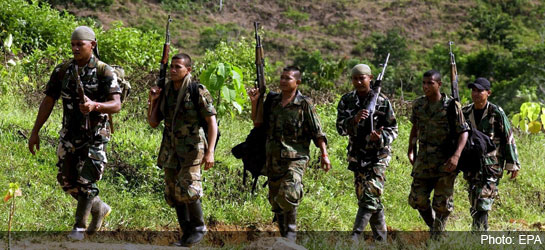
Colombia’s neo-paramilitary groups continue to enjoy the protection of elements of the state, the director of a leading think tank said Tuesday.
In an interview with Colombia Reports, Leon Valencia, director of Corporacion Nuevo Arco Iris, which monitors Colombia’s illegal armed groups, said “it is impossible to exhibit such a degree of illegal activity without the protection of the security forces and without ties to politicians.”
“The day the state as a whole is directed to pursue all of these people is the only time it can be over,” he added.
Explaining his remarks, Valencia outlined how the organizational structure supporting such groups is made up of three essential elements.
“On the one side there is the illegal [neo-paramilitaries], who are hidden away and have a secret life, the second tie is the one in civil life, who are lawyers, businessmen and people who have a good stature, and then there are the police and military.”
Valencia went on to explain that the frequency of failed police actions against drug trafficking operations, whereby no illegal activity could be detected despite good intelligence supporting the action, can only be the result of “immediate feedback” from within the security forces warning of the impending sting.
The neo-paramilitary groups, referred to as “BaCrim” or criminal gangs by Colombian authorities, were formed by commanders of paramilitary groups which operated under the demobilized paramilitary organization of the AUC, as well as the armed squads from now-defunct drug organizations like the Norte del Valle and Medellin cartels.
The AUC officially began disbanding in 2003 and by 2006 up to 30,000 people had officially laid down arms.
But the demobilization process has be heavily criticized, with “substantial evidence that many of the participants were not paramilitaries and that a portion of the groups remain active,” according to the Human Rights Watch World Report 2012.
Former President Alvaro Uribe has regularly claimed “paramilitarism” had ended, and ties between officials and illegal armed groups had been cut with the demobilization of the AUC and the prosecution of politicians with ties to paramilitary groups.
The continued activity of these groups was highlighted this month when Los Urabeños, one of the largest active groups, imposed an “armed strike,” halting all commercial activity and transportation under threat of violence, which paralyzed large parts of northern Colombia, in retaliation for the death of one of the group’s leaders at the hands of security forces.
“Don Mario,” the group’s founder and a personal friend of murdered AUC founder Carlos Castaño, is allegedly still involved in the group’s leadership.
Neo-paramilitaries have also extended their influence along the border with Venezuela, a strategic point for the flow of chemicals used in cocaine production, in which the groups are heavily involved.

